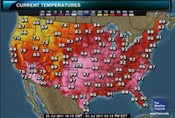Experts tell us during heat like this it’s important to drink plenty of fluids – water preferably, but anything without alcohol or caffeine will help.
How much is enough? Keith Tidball, a senior extension associate in the Department of Natural Resources at Cornell and the coordinator for the New York State Extension Disaster Education Network, says the color of our urine is the best gauge.
On Evidence-Based Living, the blog of the associate dean and associate director of Cornell Cooperative Extension, Tidball offers the following three facts to help everyone stay safe during hot weather:
1. Heat illnesses can quickly become life-threatening. In fact, according to the National Weather Service, heat is the number-one weather-related killer in the United States.
2. Your body is 50 to 70 percent water, and heat causes that water to evaporate. So staying hydrated is the most important thing you can do for your body during heat waves. Water is best, but anything without alcohol or caffeine helps. The best way to know if you’re hydrated is to check the color of your urine. If it’s clear or light-colored, you’re in good shape. If it’s bright or dark yellow, you need to drink a lot more water.
3. Prevention is key. Once you’ve had a heat-related injury, you’re more susceptible to the next one. “In the military, you would have to wear a red tape around your uniform to indicate you’d had a heat-related illness in the past,” Keith explained.
To learn more read the Evidence-Based Living blog post Serious business: The evidence on heat waves.
Tidball also suggests reading the following:
> The New York State’s fact sheet Keep Your Cool During Summer Heat explains how to identify heat-related illnesses and what to do in case of an emergency.
Older Adults: Take Extra Care When the Temperatures Soar! by the University of Florida Extension offers tips for older adults to stay cool.
The Texas Cooperative Extension offers Coping with Hot Work Environments for people who work outside in the heat.
The Kansas State University provides info on helping dogs and other pets beat the heat.





